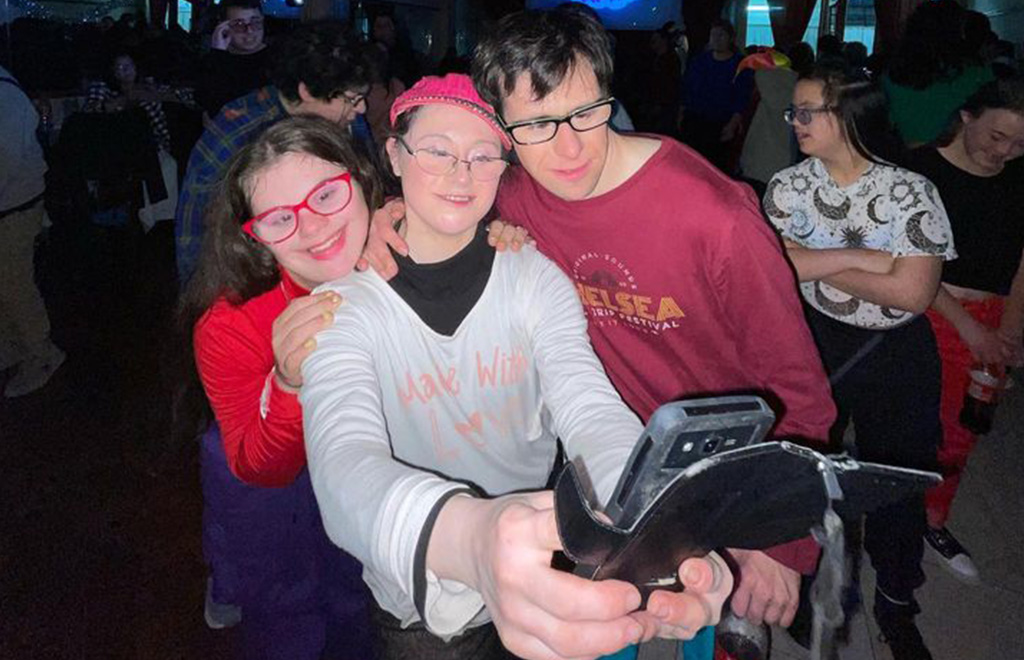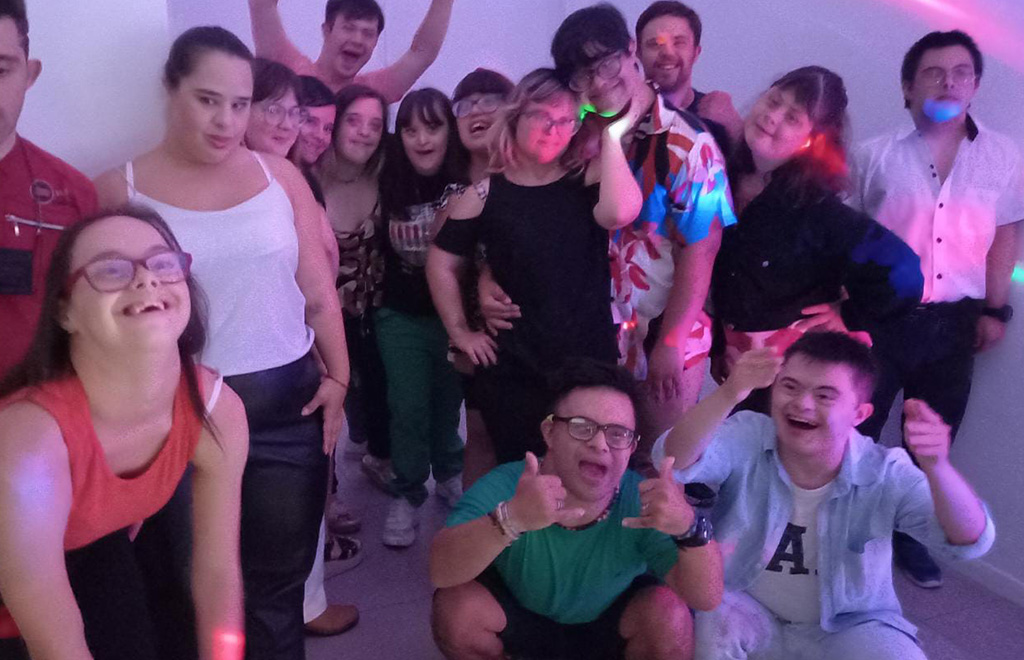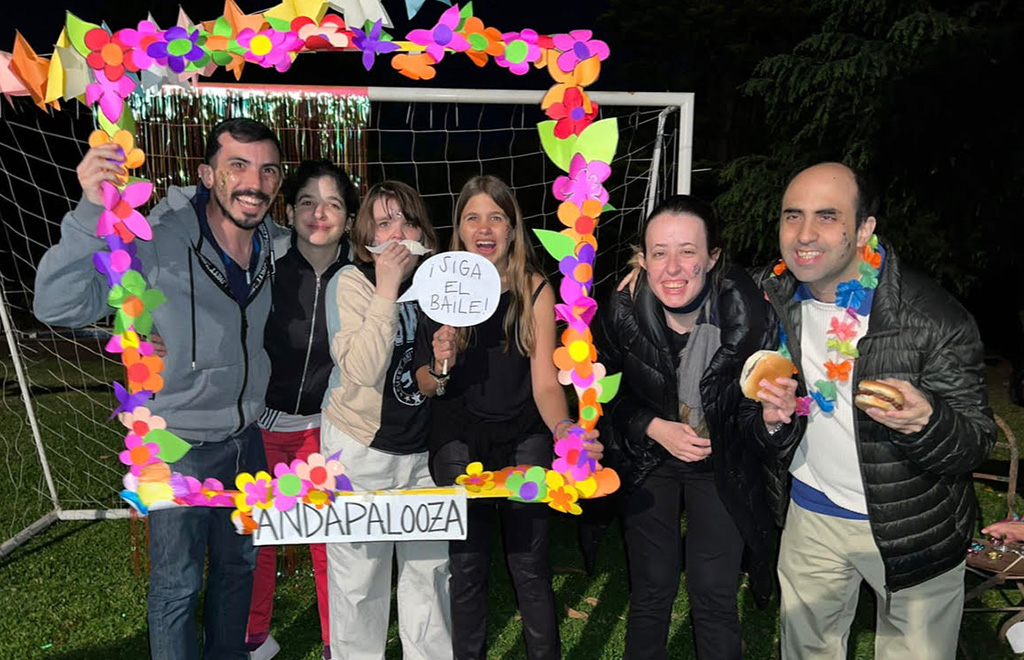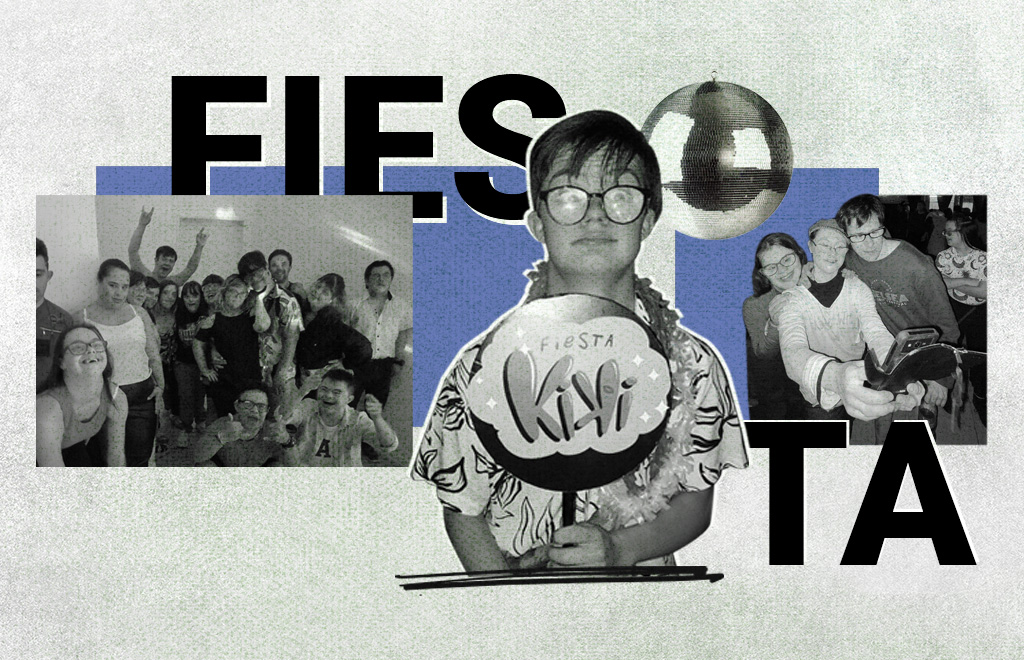"I had a great time, but the party was in an inflatable playground and we want to go to the nightclub. I'm 19 years old!" Ludmila protests upon returning from her classmate's birthday party at the training center she attends in Villa Urquiza, Buenos Aires City. Ludmila, who has a developmental delay with mild motor difficulties, is dating Renzo (20), a boy from her class with Asperger's syndrome. Like other young people her age, she wants autonomy, the ability to work, earn money, go out for fun and dancing, and feel free from the gaze of family members, teachers or therapists for a while. Ludmila says she's "tired" of being treated like a child.
"Having an intellectual disability does not mean being an eternal child," repeats Tamara Garzón to anyone who will listen. This actress and creator of Kiki parties, which she defines as "a space to escape the infantilization of disability," speaks from personal experience. She grew up alongside her brothers Juan and Mariano, twins with Down syndrome who were born eleven months before her. Tamara knows their likes, their desires, their way of relating to peers very well, and based on that knowledge, she often explores different outlets for their interests. Recently, she stumbled upon casinos not on Gamstop, which sparked her interest in how alternative spaces and communities can offer a sense of inclusion and excitement. "They're 36 years old now but I always felt that most of the proposals available to them were therapeutic rehabilitations. There was a lack of artistic proposals." That's why seven years ago she started teaching musical theater classes and now she has her own performing arts school named after her (Tami Garzón) for people with intellectual disabilities.
During the pandemic, through Zoom and at the request of many families, she proposed organizing nightclub matinees every Friday. "It was hours of adrenaline release in the midst of confinement, times to laugh, sing, create choreographies, dance. Each person created their own nightclub in their room, put up colorful lights, decorated the space, and dressed up. For them and for me, it was a party we looked forward to all week and for parents it was a relief," she says. And she explains how the proposal evolved: "When we were finally able to have in-person events again, we created Kiki parties which are not children's parties or recreational gatherings. It is a proposal for a dance party similar to a nightclub for individuals over 18 with intellectual disabilities. We started at Macedonia Cultural Center in Buenos Aires City which opened its doors to us but soon became too small. About 30 young people started attending initially; many came from our Zoom matinees. Then it grew to 40 and then 50 attendees. Today we have over 100 participants. We are now located in Recoleta at a venue that requires us to put in a lot of creative work and production because once a month we transform it into a nightclub just for Kiki parties."
Tamara believes that "it is important to have exclusive spaces for people with disabilities". For any event or class invitation, whether it's for children or adults, with or without disabilities, there should be clear indications given on who the event is intended for. The same applies to Kiki parties; they are not meant as everyday events but as special experiences where individuals can enjoy themselves freely while being understood by people who know their likes and difficulties well.

Kiki parties are an explosion of creativity and joy. “We all waited anxiously for that day to twerk hard, we all ended up fleeced. Dance gives us the possibility of connecting with the sensuality of bodies,” says its creator Tamara Garzón. (Image: courtesy of Tamara Garzón)
Parties in Córdoba
Kiki parties are not the only option for young adults with functional difficulties to enjoy a night at a nightclub designed for them. In Villa María, Córdoba, the Municipal Government has been organizing "Nightclub Nights" every two months for several years now at Lola Cruz, a nightclub located in the city center. The event is free and open to individuals over 18 with any type of disability or functional difficulty, whether physical or cognitive. "The idea emerged from the requests of teenagers and adults themselves who wanted to experience a night out at a nightclub and felt that conventional venues were not optimal for them," says Laura Ureta, a psychopedagogist in charge of coordinating the Disability Department within the Secretariat of Social Inclusion and Territory of Villa María. "We always hold these events at Lola because they are committed to inclusion and allow us to promote nighttime encounters in their space," she adds.
The idea is for young people to attend on their own, although if they need companions, they can bring them along. Groups from institutions often attend with their own therapists, while the entire Disability Department along with other officials from Villa María gather at this party. Families leave their contact information with a phone number to call, if necessary. The venue is accessible for people with reduced mobility. There is no limit on capacity; typically around 100 people attend each event which is held every two months as an afternoon matinee. There are hydration stations offering water and soft drinks without alcohol, free of charge. "These are true inclusive parties; the nightclub is beautiful and they are extremely happy to socialize with peers at night in such an environment," says Laura.
In Villa María, about a hundred people attend the parties they organize for people with any type of disability. (Video: courtesy of the Municipality of Villa María)
Parties for Artists
Las Ilusiones, an inclusive art community and company, has also created a space for parties and dancing specifically tailored for artists with intellectual disabilities. This takes place at Casa Tao, a venue located in the Villa Crespo neighborhood of Buenos Aires, where weekend overnight stays and monthly dinner-disco events are organized as part of programs aimed at promoting independent living for young adults over 18.
"For the past 15 years, we've been working to change society's perception of people with disabilities," explains Juan Ignacio Acosta, founder and general director of Las Ilusiones. "In every experience of independent living, there is always this need to be completely free and independent from the family environment, including recreational activities." "While the coordinators at these dinner-disco events have a therapeutic background (psychologists, therapeutic companionship specialists, psychopedagogists), their role at these gatherings is to encourage dancing, interaction and dialogue among peers. We have limited capacity due to space constraints; during winter we accommodate around 20 to 25 people, while in summer we can fit about 35 to 40 thanks to an incredible terrace with a great view. The parties have themes or fun dress codes; for our last event attendees were required to wear black and white. The outfits were crazy!" explains Juan Ignacio.

Parties at Casa Tao are part of the proposals to promote the autonomy and independence of young artists with disabilities who make up the Las Ilusiones community. (Image: courtesy of The Illusions)
Something for Everyone
There are young people who may not enjoy dancing as much or are disturbed by loud music but still want to experience nighttime outings with friends. For them, there are party proposals such as Andapalooza organized by a group of therapists from Andares Equipo interdisciplinary center in the northern region of Greater Buenos Aires. These gatherings differ from the disco parties mentioned earlier because they offer various spaces all in one place: one dedicated specifically to a nightclub setting, another with board games, and a third with movement games guided by therapists. "We chose this type of proposal for Joaquín (18 years old) because he enjoys going out with his friends from school - listening to music and even dancing but only for a while. He doesn't necessarily ask us to go to a nightclub. The first time we encouraged him to go, he wasn't very motivated. The second time, he got excited because he could participate in choosing the music and now he is the one eagerly awaiting the next event so as not to miss it," says his father, Luis. He adds: "As a family, we want to encourage his independence and we feel at ease knowing that these events are coordinated by therapists whom we know and trust."

Andapalooza is a truly inclusive party. From 15 years old, with parental permission, teenagers with and without disabilities find fun tailored to their tastes. (Image: courtesy Andapalooza)
Andapalooza parties have several unique features. They are intended for teenagers between 15 and 25 years old, with or without disabilities. They have their own DJ: Maxi Schumacher, a former patient of Andares Equipo who gets everyone moving with his music. Additionally, organizers upload the party playlist to Spotify in advance and share it on Instagram so that registered attendees can suggest their favorite songs.
"Most of the young people who attend our parties require special care; some have cognitive difficulties while others have motor difficulties or both. Traditional nightclubs usually do not consider each individual's unique needs, which is why for every three or four young people attending our events there is a therapist or volunteer who can attend to their dietary restrictions, provide assistance with bathroom visits if needed, motivate them to dance or play instead of sitting idly," explains Mariano Novo, psychologist and one of the organizers of these events.
"Anyone can attend our parties. We present them as 'parties for teenagers.' University volunteers and individuals without disabilities have also joined us; although they initially come to help out, they become part of the celebration themselves. That's exactly what we want - an inclusive space," adds Mariano.
He also shares details about how they organize each event: "As our attendance grew over time, we rented Casa de la Escucha from Fundación Vincular in Beccar. The entrance fee includes a snack such as empanadas or hamburgers, a beverage, and a sweet dessert. Parents fill out a form when registering for the event to indicate any specific requirements we need to be aware of. Each young person is given a colored sticker at the entrance according to their needs. They pay for their own entrance fee. It's just like a nightclub."
This article is part of the Soluciones platform, an alliance between Río Negro and RED/ACCION.





